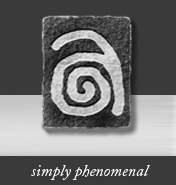On Music Heard from No Apparent Source
May 3, 2007
 Annalisa Ventola, who is author of the excellent blog Public Parasychology, recently reviewed two of D. Scott Rogo’s books in the Journal of Scientific Exploration, which by the way has the best book review section on topics of interest to us of any publication. The two books, A Casebook of Otherworldly Music and A Psychic Study of the Music of the Spheres, relate paranormal music experiences to out of body experiences, survival after death, and other psychic phenomena. Ventola writes that “Being both a musician and a student of psychical research, Rogo was in a unique position to provide an original contribution to the field, and did so by the age of twenty …” Ventola chose not to focus her criticism on Rogo’s “naivety about what constitutes proof of survival as well as the proper uses of certain statistical terms,” as she notes that Rogo’s subsequent books, some of which have been published by Anomalist Books, reveal a “developing maturity of the author both in the sense of his writing style and his methods of critical analysis.”
Annalisa Ventola, who is author of the excellent blog Public Parasychology, recently reviewed two of D. Scott Rogo’s books in the Journal of Scientific Exploration, which by the way has the best book review section on topics of interest to us of any publication. The two books, A Casebook of Otherworldly Music and A Psychic Study of the Music of the Spheres, relate paranormal music experiences to out of body experiences, survival after death, and other psychic phenomena. Ventola writes that “Being both a musician and a student of psychical research, Rogo was in a unique position to provide an original contribution to the field, and did so by the age of twenty …” Ventola chose not to focus her criticism on Rogo’s “naivety about what constitutes proof of survival as well as the proper uses of certain statistical terms,” as she notes that Rogo’s subsequent books, some of which have been published by Anomalist Books, reveal a “developing maturity of the author both in the sense of his writing style and his methods of critical analysis.”
 Ventola then summarized Rogo’s conclusions: “According to his content analysis, both experiences [transcendental music and out of body events] manifest during similar mental states, and the type of music heard (i.e. choral vs. instrumental or melodic music vs. music without a discernable melody) coincides with the type of OOBE (natural vs. enforced) reported. Rogo’s analysis also uncovers what he calls a ‘crescendo effect’ in the majority of the collected cases, in which the experients report the volume of mysterious music gradually being heard, rising to full power, and receding again.” Ventola ends her review with quite a compliment: “It is admirable that someone so young, without having yet completed a formal education, would not only have the initiative to collect reports about little understood or discussed phenomena, but also have something meaningful to say about them.”
Ventola then summarized Rogo’s conclusions: “According to his content analysis, both experiences [transcendental music and out of body events] manifest during similar mental states, and the type of music heard (i.e. choral vs. instrumental or melodic music vs. music without a discernable melody) coincides with the type of OOBE (natural vs. enforced) reported. Rogo’s analysis also uncovers what he calls a ‘crescendo effect’ in the majority of the collected cases, in which the experients report the volume of mysterious music gradually being heard, rising to full power, and receding again.” Ventola ends her review with quite a compliment: “It is admirable that someone so young, without having yet completed a formal education, would not only have the initiative to collect reports about little understood or discussed phenomena, but also have something meaningful to say about them.”









